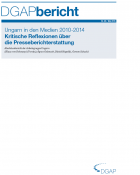A Hungarian-language version is available here and at the bottom of this page for download.
Read the full report in English here.
From the Conclusion [extract]:
In numerous meetings with both Hungarian and German external experts, the Working Group conducted intense discussions on the developments in Hungary and their coverage in German-language and international media. This process brought to light differing opinions and assessments.
On the basis of our interviews with experts, the Working Group is nevertheless of the overall opinion that Hungary today is a free and democratic state that respects the rule of law, where the press is not subject to censorship. The current administration does not support anti-Semitism; in fact, the state has taken significant steps to fight anti-Semitism. Judicial independence exists in the country as well.
That said, Orbán’s strongly party-influenced position has led to party-influenced personnel decisions that are neither good for the individual institutions nor ultimately beneficial as a whole, in that it could restrict the diversity that ever democracy needs.
The Working Group’s numerous discussions clearly showed that, while some of the points made in the media today against Orbán’s administration are accurate, many accusations are greatly exaggerated or even factually incorrect.
No country and no government is perfect. Nevertheless, no dialogue involving the peoples of Europe can be fruitful if it is based on prejudice and bias. Criticism is necessary, but it must be grounded in cogent argument and backed by evidence. This is equally applicable to all EU states. Criticism should not be made as a condemnation but should rather be used constructively to make a step forward in the developmental process of European democracy.
Recommendations
In both our examination of media reporting as well as in our discussions with German and Hungarian experts, it became clear that the reporting of numerous media sources is simply incomplete and one-sided, and at its worst deeply flawed. Such reporting leads readers to draw skewed conclusions about the situation in Hungary. Unfortunately, this negatively influences how the country is seen across the spectrum of German politics. Due to a combination of misunderstandings, mistakes, omissions, and political prejudice in reporting, it is no longer possible to judge to what degree the developments in Hungary in fact contradict European democratic values on the one hand, or on the other hand are at all different from what occurs in Germany, for example – but nevertheless are neither antidemocratic nor anti-European and therefore should be accepted, if only on the grounds of national sovereignty.
The quality of reporting could be improved if:
- the information reported were closely checked and critically examined through conversations with either politically independent experts or experts with differing political views;
- research consultation expanded beyond the small circle of famous German-speaking Hungarians or Hungarian exiles in Germany to include other recognized scholars and experts;
- specific events or developments were reported in context, with ample background explanation, and only on the basis of verifiable information.
Read the full report here.



